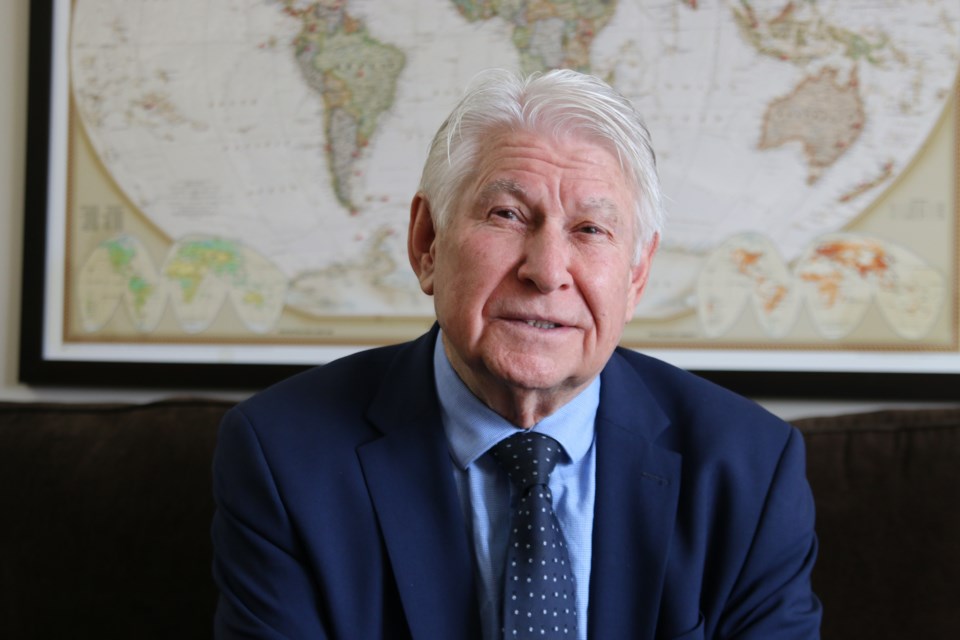THUNDER BAY — President Donald Trump has announced several tariffs will be imposed on goods travelling the Canada-U.S. border starting Tuesday.
In response, border mayors in both Canada and the U.S. began mobilizing Friday alongside the Ontario and Canadian governments to deal with the ‘trumped up’ tariffs now on their plates, said Ken Boshcoff, mayor of Thunder Bay.
“Certainly, the Canadian mayors and our counterparts in the United States have had longer relationships as border cities,” said Boshcoff.
“And I think we understand each other a lot more that both of us need each other to be friends and to trade fairly and equally, which has essentially been happening for literally decades.”
Boshcoff explained that the border mayors and U.S.-Canadian mayors’ groupings are all writing letters asking for a quick resolution to the possible trade conflict.
“When you're friends and allies and you have basically the world’s longest and safest border, you really don’t want to jeopardize that kind of relationship,” said Boshcoff.
He added that everybody coming together for a common cause should send a pretty strong message to the American president.
“I think the American mayors understand, as well as anyone, that we’re friends. We value each other, they value us as tourists, we value them as tourists, but on the harder economic side, we need each other as trading partners both for raw materials and for finished product,” said Boshcoff.
In the meantime, he encourages Thunder Bay and other border communities to hold tight and not panic until they really have a firmer grip on the situation.
“The stone is splashed into the water, so there’s a lot of heavy waves and ripples,” said Boshcoff.
“And so, let’s just see what analysis is going to bring with this and how it’s going to start affecting manufacturing and basically transportation, all of these things.”
However, if tariffs continue to pile on, Boshcoff did state that as a trading city and port, Thunder Bay would be one of the hardest hit in the country, primarily because of what it trades.
Charla Robinson, the president of the Thunder Bay Chamber of Commerce, said with 13 per cent tariffs already on lumber because of the ongoing softwood lumber dispute, these tariffs will be an additional 25 per cent on top and rise to about 38 per cent.
“I mean, that’s a pretty significant tax on your product going across the border to the States and so that’s why the lumber in particular will be so much more of an impact because it’s such a large amount because of the two layers of tariff that are involved,” said Robinson.
She said that with the forestry sector a crucial pillar of the regional economy and a major exporter to the United States, these tariffs will harm the local community.
Robinson added while the city waits to see how things roll out, there is also definitely the expectation that community businesses will feel some pain from the tariffs.
“Forestry is the largest part of our exports locally, but there’s also a lot of other businesses that do exports, whether it’s chemicals, whether it’s food manufacturing, whether it’s even medical supplies,” said Robinson.
“So, there’s a whole bunch of smaller businesses that will also be impacted, but certainly the larger concern is forestry because it is such a big pillar of our underlying economy generally if that becomes strongly impacted, we’ll feel that more harshly.”
However, on a positive front, she added that it offers the opportunity for Canada to come together and start tearing down current interprovincial barriers, so that they can better support each other.
“Whether it’s wine from B.C. or different things that right now it’s very difficult to get across the borders between the provinces. It’s time to break down all of those interprovincial trade barriers so that Canadian is Canadian and we can support all Canadian businesses and products to the best of our ability,” said Robinson.
